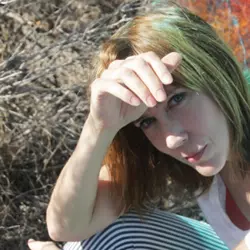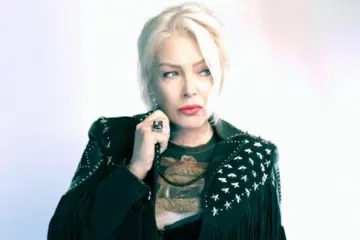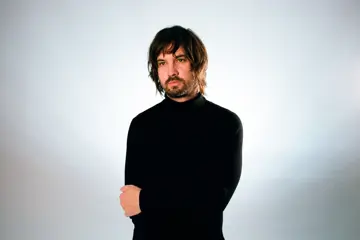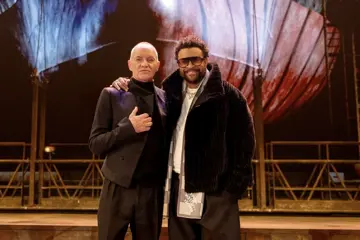 Beth Orton
Beth OrtonOh Mercy frontman Alexander Gow's raspy voice fills the church, which is already almost full as he plays his last song. It's a first-in-best-dressed kind of gig, but anywhere in the church provides a good view – the audience is about to experience intimacy with Beth Orton, with stained glass windows and candles as the backdrop. The tall, lanky, dirty blonde starts with an a cappella version of Pieces Of Sky, her haunting voice slightly shaky and scratchy. She seems somewhat self-conscious at first, mumbling to the audience and barely looking at them. She doesn't look like the 40-something-year-old she is, instead, she could be mistaken for a teenager, her wrinkle-free face, button nose and mannerisms encapsulating the wild child she once was.
“I'm completely in love with Melbourne. I'm wearing my best Melbourne dress,” she says of her vintage-looking threads, taking one of her two guitars to play State Of Grace. Beth finds it funny to be playing in a church. “We've got the last supper up there,” she says, motioning to the painting on the wall in one corner. “That always puts me at ease.” About Poison Tree, she says: “I like the melody, I don't like the words. Thanks, William Blake.” Last Leaves Of Autumn is a heartfelt, beautiful song which sounds perfect on the piano with no other accompaniment. Her voice reaches high pitches and sultry lows. The song is moving, a highlight. She has truly warmed up now and everything she says gets a laugh from the audience. She's a quirky woman, her chatter erratic and unfiltered. “It's huge, this piano!” she laughs. The jazzy Worms sounds wonderfully stripped back live on the piano, her voice sounding remarkably similar to Fiona Apple's. “Oh look, a cup of tea,” she giggles. The cup of tea makes the perfect segue for her to tell the crowd a detailed story about leaving her guitar in a taxi and losing it, and subsequently getting it back. She's got a husband now, and kids and things, she rambles, and it's hard to keep track of things. Her story fills the church with laughter. The moral of the story, she says, is to never lose anything.
She plays Someone's Daughter, and suddenly, the seemingly calm and respectful crowd starts heckling, calling out the names of songs they'd like played. “No, I'm not playing that,” Orton responds with a smile to one request. “Not playing that either,” she says to another. But it doesn't stop, and she shouts, “Jesus Christ!” The audience laughs. “It had to be said.” She Cries Your Name gets a big applause, and she disappears off the stage. It does seem as though she's been playing for a long time, the audience hypnotised by her soothing voice. Couples cuddle up in the church pews, letting her songs envelop them. She comes back out to the stage, playing Central Reservation and Stolen Car. “I've got nowhere else to be,” she jokes with the crowd, and finishes with Pass In Time, the lyrics about a mother talking to her child. It's an apt song to finish on, the strong voice of the once hippie youth who is now a mother herself.















